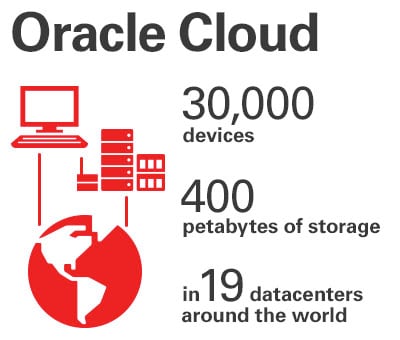 Cisco has formed Intercloud partnerships with Deutsche Telekom, BT, Equinix, NTT Data and over 30 additional companies, demonstrating significant momentum behind its strategy to bring programmable networking to the interconnection of private and public clouds.
Cisco has formed Intercloud partnerships with Deutsche Telekom, BT, Equinix, NTT Data and over 30 additional companies, demonstrating significant momentum behind its strategy to bring programmable networking to the interconnection of private and public clouds.Cisco now aims to bring its Intercloud fabric into 250 of the top co-location data centers worldwide in the coming months, significantly advancing its goal of making Intercloud the leading architecture and ecosystem for exchanging cloud traffic. The company will dedicate $1 billion from its financing division to accelerate these key rollouts.
Intercloud, which Cisco first announced in March 2014, is a distributed network and security architecture designed for interconnecting high-value application workloads between clouds while retaining high security and local data sovereignty. Intercloud uses APIs to connect cloud IT services across a data center network It supports OpenStack and multiple hypervisors. It is based on Cisco's Application Centric Infrastructure (ACI).
At a press event in Silicon Valley, Rob Lloyd, Cisco's president of development and sales, described Intercloud as "the phase of the Internet," saying the challenge of interconnecting today public and private clouds in many ways resembles the challenges of the early Internet.
“Just as Cisco played a leading role in connecting isolated islands of LANs to architect the modern Internet, Cisco’s Intercloud Fabric and Application Centric Infrastructure innovations uniquely position us to connect disparate cloud services to unlock the full potential of cloud, and with it a new era in IT,” said Lloyd.
Some highlights:
- Deutsche Telekom plans to deploy Intercloud nodes within its state-of-the-art data centers in Germany. The DT Intercloud will be operated by T-Systems to deliver sovereign and secure Infrastructure as a Service (IaaS) offerings that meet Germany’s strict data protection standards. Deutsche Telekom’s new Intercloud infrastructure, based on OpenStack to allow DT to standardize and scale their services globally, will incorporate Cisco’s suite of cloud solutions, including Cisco Intercloud Fabric and Cisco Application Centric Infrastructure (ACI), which includes Cisco Nexus 9000 Series switches and the Cisco Application Policy Infrastructure Controller (APIC).
- BT will deploy Cisco Intercloud Fabric in its 45 data centers worldwide. BT will become fully Intercloud enabled to support highly secure, global hybrid clouds with unparalleled workload portability for BT’s customers. BT Cloud Compute is a pre-provisioned data center infrastructure that enables customers to create, deploy, monitor and manage their own cloud service. It integrates advanced Cisco technologies and is available in major economies across Europe, the Americas, the Middle East and Africa and Asia Pacific.
- Cisco will offer its own Intercloud infrastructure as a service (IaaS) in its own data centers and with its own switches and UCS servers. Cisco will also offer its own cloud services based on the Intercloud architecture.
- Equinix will deploy the Cisco Intercloud, including the Cisco Nexus 9000 Series switch, Cisco APIC, and the Cisco Evolved Services Platform, for the Equinix Cloud Exchange, which is available in major markets worldwide. The companies plan to develop a hosted private cloud solution that utilizes the Equinix Cloud Exchange to deliver highly secure private access to the rich ecosystem of cloud service providers in Equinix data centers globally. Cisco plans to deploy Intercloud capabilities in 16 Equinix markets across Europe, Asia and the Americas.
- Cisco will use its Meraki platform to help Service Providers offer secure cloud VPNs to SMBs.
- Other announced Intercloud partners include ANS Group, CGI Group, Cirrity, CTI, Dimension Data, Ethan Group, Infront Systems, LightEdge Solutions, LG CNS, Logicalis, Long View, Netelligent, NWN, NetApp, NTT DATA, OneNeck IT Solutions, OnX Managed Services, Peak 10, Presidio, Proxios, PT Portugal/Oi, Quest Media and Supplies, RedHat, Steria, Sungard, Telstra, VCE, Virtustream and Wipro.
- Comstor, Ingram Micro Inc. and Tech Data will become cloud aggregators for Cisco.
- Cisco Intercloud Fabric has now been officially released to customers.
- Cisco Capital has earmarked $1 billion to accelerate rollout of these solutions.

http://newsroom.cisco.com/press-release-content?type=webcontent&articleId=1494528
- In November 2013, Cisco unveiled its Application Centric Infrastructure for data centers and clouds. In a press event in New York, John Chambers described ACI as the next big transformation of the IT industry driven by imperatives of the application economy.
ACI is a step beyond virtualization and software-defined networks (SDN), said Chambers, because it brings agility and automation with full visibility and integrated management of both physical and virtual networked IT resources at the system, tenant, and application levels. The architecture promises a pay-as-you-grow mode scaling to over 100,000 switch ports and capable of supporting more than one million IP end points in a data center spine with 60 Tbps capacity. A key premise is that the network should adapt to application requirements through dynamic insertion and chaining of physical and virtual L4-7 network services including firewalls, application delivery controllers, and intrusion detection systems. The new architecture is designed for multi-tenant cloud environments by providing real-time view of per tenant and per application health, statistics, and troubleshooting. Real-time analytics will be used to drive intelligent application placement decisions.
The foundation for ACI is an Application Policy Infrastructure Controller (APIC), enhanced versions of the NX-OS data center switching operating system, and a new line of Nexus 9000 data center switches based on technology from Insieme Networks, the Cisco spin-in start-up that is being acquired and re-integrated into the company.





















